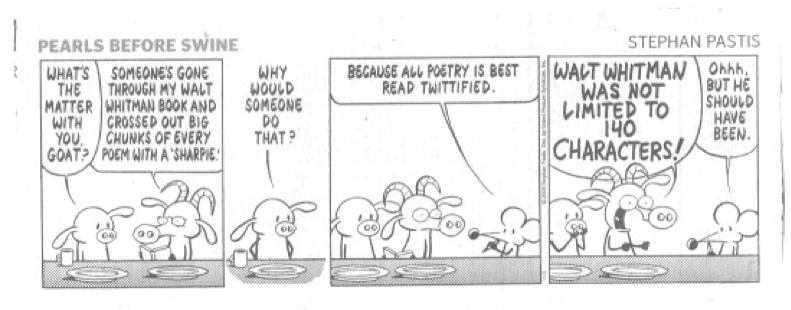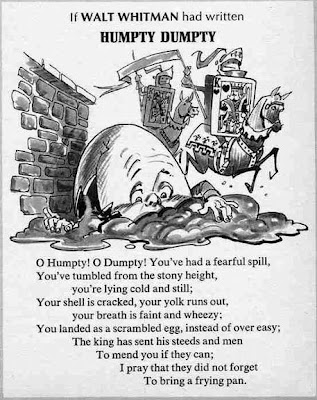In thinking about Whitman’s legacy, I got curious about how much Modernist writers beyond Pound and Williams were engaging him– that is, how much he’d become a common name or referent in writing of the time. So I went to the awesome and ever-growing Modernist Journals Project to poke around. A search for “Walt Whitman” (used first name to screen out candy advertisements, but it probably limited my hits) yielded 111 references. In addition to the examples below, which represent just a fraction, reviews and advertisements for Traubel’s volumes, for a volume of Whitman’s letters with Anne Gilchrist, for publications of Leaves, etc. indicate an interest in Whitman as well. Throughout the magazines, Whitman is compared to Poe, to Lincoln, to Mallarme, to Swinburne, to Blake, etc. etc.
One of the most prominent uses of Whitman is that the journal Poetry, of central importance in the history of Modernism, from its very first issue in 1912 included this on its back cover:
To have great poets there must be great
audiences, too.—Whitman.
HELP us to give the art of poetry an organ in America. Help us to give the poets a chance to be heard in their own place, to offer us their best and most serious work instead of page-end poems squeezed in between miscellaneous articles and stories.
If you love good poetry, subscribe.
If you believe that this art, like painting, sculpture, music and architecture, requires and deserves public recognition and support,subscribe.
If you believe with Whitman that “the topmost proof of a race is its own born poetry,” subscribe.
Throughout various issues, the question of whether or not great poetry needs great audiences is actively taken up by Harriet Monroe, Poetry‘s editor, and Ezra Pound, who disagree about it. Eventually, by the start of Volume 2, the back cover uses only that quote by Whitman and dropped the rest of the text above.
By October 1915 in Poetry, a comment written by Alice Corbin Henderson, engaging with a critical letter written about the publication of Carl Sandburg in the magazine (ouch! take that, Mr. Hervey!), calls on Whitman as an elder statesman, a judge of all that is good in poetry:
“And, by the way, what, oh, what do you suppose Walt would have thought of Miss Monroe’s magazine if he had lived to see it?” So asks Mr. John L. Hervey in a recent letter to The Dial. The question is delightfully suggestive. We would love to know just what Walt Whitman would have thought of POETRY. It is not impossible that Mr. Hervey thinks that Walt would have thought of POETRY just what he, Mr. Hervey, thinks of the magazine. No doubt it is under this conviction that Mr. Hervey delivers this last, smashing blow! Still, there isn’t any way of being sure that Walt would have come out on Mr. Hervey’s side. Walt was very tolerant ; tolerant of poets—you remember his charming, “I like your tinkle, Tom,” to Thomas Bailey Aldrich ; also tolerant of editors—of Richard Watson Gilder, to whom Whitman’s November Boughs “did not appeal” for publication in The Century.
No, it’s a toss-up just what Walt would have thought about the magazine. Undoubtedly, he would have thought about it just as each of you, whoever you are, now reading this magazine, think about it. For the great dead, curiously enough, always mold their opinions to suit their admirers. . . . And now Mr. Hervey wants Miss Monroe to say what Carl Sandburg’s poems will mean to the reader of fifty years hence, if she thinks any of them will live that long. Mr. Hervey himself does not risk a direct opinion. Fortunately there were people intelligent and courageous enough to risk an opinion on Whitman fifty years ago. And these people were not the editors of magazines, who “knew what the people wanted,” and took no risks. If Whitman had waited for them, Mr. Hervey might have missed his Walt, and he would then have had to invoke some other shadowy figure . . . to pass mythical judgment upon the new poetry. . . . Would Walt applaud the risk taken by Miss Monroe in publishing it, or would he, too, like Mr. Hervey, be shocked by her temerity?
In volume 1.3 of Poetry (1912), this discussion of Whitman’s continental influence is given:
It is significant of American tardiness in the development of a national literary tradition that the name of Walt Whitman is today a greater influence with the young writers of the continent than with our own. Not since France discovered Poe has literary Europe been so moved by anything American. The suggestion has even been made that ‘Whitmanism’ is rapidly to supersede ‘Nietzscheism’ as the dominant factor in modern thought. Léon Bazalgette translated Leaves of Grass into French in 1908. A school of followers of the Whitman philosophy and style was an almost immediate consequence. Such of the leading reviews as sympathize at all with the strong ‘young’ movement to break the shackles of classicism which have so long bound French prosody to the heroic couplet, the sonnet, and the alexandrine, are publishing not only articles on ‘Whitmanism’ as a movement, but numbers of poems in the new flexible chanting rhythms.
In the second volume of BLAST, a Vorticist journal edited by Ezra Pound and Wyndham Lewis, a column entitled AMERICAN ART contains the following:
American art, when it comes, will be Mongol, inhuman,optimistic, and very much on the precious side, as opposed to European pathos and solidity.
Wait Whitman Bland and easy braggart of a very cosmic self. He lies, salmon-coloured and serene, whitling a stick in a very eerie dawn, oceanic emotion handy at his elbow.
What?! BLAST also describes a book as having “a soul like Walt Whitman, but none of the hirsute mistakes of that personage, and invention instead of sensibility” (!).
Whitman appears comparatively in book reviews, as in this one on D.H. Lawrence (authorial commentary: boo Lawrence): “‘Leaves of Grass ‘ rise to one’s mind as this fine catalogue is proclaimed; it seems to me now that Walt Whitman’s poetry is the only proper parallel to Mr. Lawrence’s ‘Sons and Lovers'” (The Blue Review 1.3).
Whitman is referenced repeatedly as a thinker moreso than poet in The New Age, a publication which describes itself as “an independent socialist review of politics, literature and art” or, eventually, “a weekly review of politics, literature and art” (examples just below from issues in 1907):
The dominant idea of Whitman, for example, is undeniably friendship, or what he calls camaraderie ; and the fact that the early Socialists called each other Comrade without distinction of sex is Significant.
This example, from a book review of a collection by Edward Carpenter, is bound to make Brendon as mad as it made me:
The politicians may make Socialism ; but such a spirit as Carpenter’s is required to make Socialists. I remember making in a moment of dubious inspiration an epithet for Carpenter that appeared to me at the time essentially true. I called him Mrs. Whitman. Whitman certainly impressed one with the sense of masculinity ; and equally certainly there are qualities in Carpenter that strike one as womanly.
In February 1910, a writer laments the shaky condition of American letters:
Nothing mortified me so much as to be told by an Englishman that Europe absorbs our finest talent. I was angry. He then began to call the names–Whistler, Sargent, Shannon, Abbey, Henry James, Henry Harland, and others of whom I had never heard. He named so many I cannot recall them. He wound up by saying Walt Whitman would have been far happier had he lived in England where he would have had a public instead of a small coterie in his own country. Needless to say my anger gave place to shame and mortification.
In November 1915, The New Age reprints this part of a review of a translation of Whitman (as an example of an ass’s bray):
To him all is without exceptions just as in prostitution to him all men are “friends,” just as to the prostitute everyone is a guest. Pah ! Pah ! What blindness! Whitman is blind and deaf, for he does not distinguish and, therefore, does not select, neither colours nor sounds nor persons. And the human soul?–he has no comprehension of it.
We too beg, of course, to disagree.


























